Episodic Memory and Related Studies
VerifiedAdded on 2020/10/22
|7
|1837
|156
AI Summary
The given assignment is a compilation of various research papers and studies on episodic memory, covering topics such as neural substrates, encoding and retrieval, and the impact of repetition, emotion, and context information. The sources include doctoral dissertations, journal articles, and book chapters from reputable publishers like Oxford University Press and Nature Reviews Neuroscience. The assignment aims to provide a comprehensive understanding of episodic memory research and its related studies.
Contribute Materials
Your contribution can guide someone’s learning journey. Share your
documents today.

Psychology: Literature Review
Secure Best Marks with AI Grader
Need help grading? Try our AI Grader for instant feedback on your assignments.

TABLE OF CONTENTS
INTRODUCTION...........................................................................................................................1
Literature Review .......................................................................................................................1
CONCLUSION................................................................................................................................3
REFERENCES................................................................................................................................4
INTRODUCTION...........................................................................................................................1
Literature Review .......................................................................................................................1
CONCLUSION................................................................................................................................3
REFERENCES................................................................................................................................4
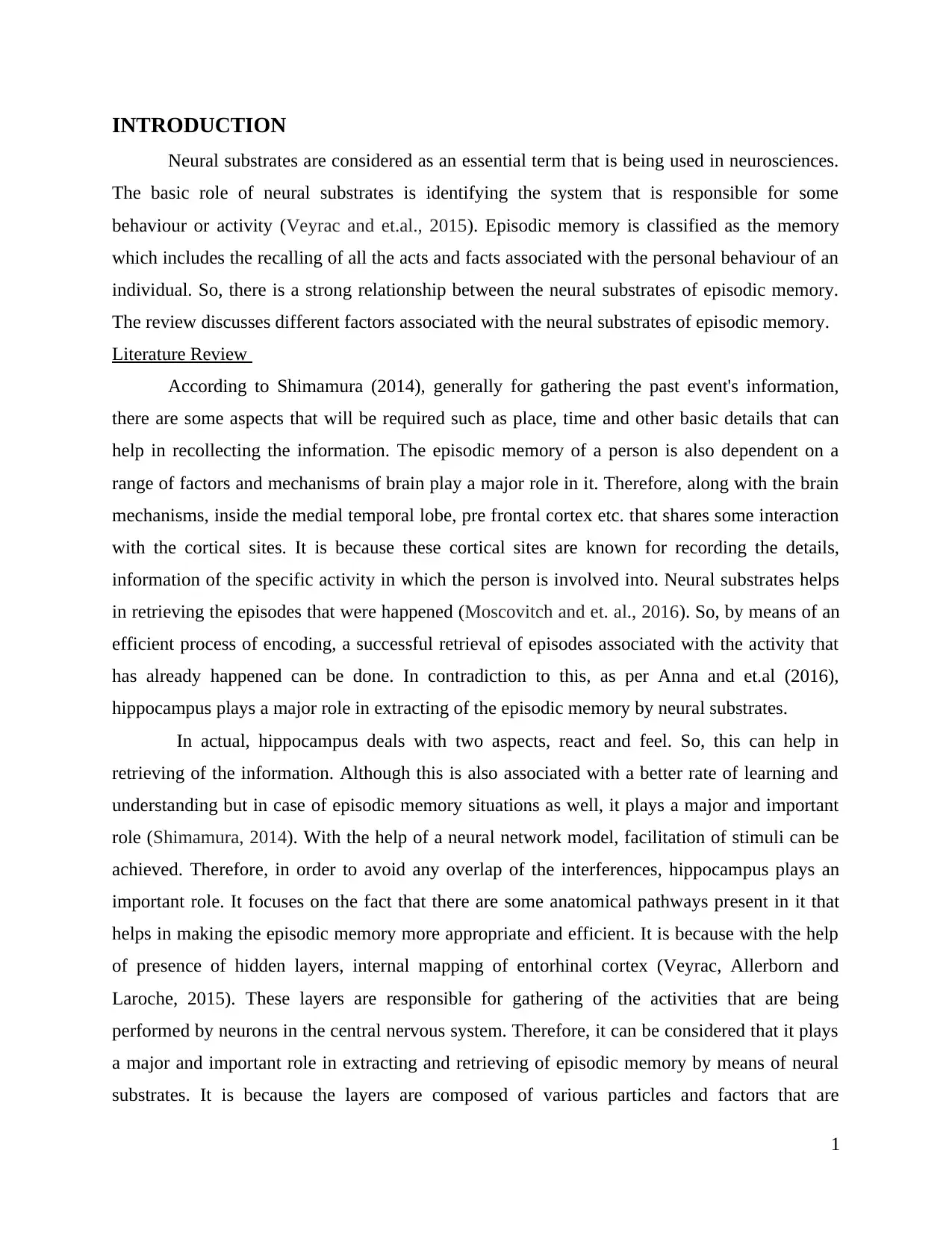
INTRODUCTION
Neural substrates are considered as an essential term that is being used in neurosciences.
The basic role of neural substrates is identifying the system that is responsible for some
behaviour or activity (Veyrac and et.al., 2015). Episodic memory is classified as the memory
which includes the recalling of all the acts and facts associated with the personal behaviour of an
individual. So, there is a strong relationship between the neural substrates of episodic memory.
The review discusses different factors associated with the neural substrates of episodic memory.
Literature Review
According to Shimamura (2014), generally for gathering the past event's information,
there are some aspects that will be required such as place, time and other basic details that can
help in recollecting the information. The episodic memory of a person is also dependent on a
range of factors and mechanisms of brain play a major role in it. Therefore, along with the brain
mechanisms, inside the medial temporal lobe, pre frontal cortex etc. that shares some interaction
with the cortical sites. It is because these cortical sites are known for recording the details,
information of the specific activity in which the person is involved into. Neural substrates helps
in retrieving the episodes that were happened (Moscovitch and et. al., 2016). So, by means of an
efficient process of encoding, a successful retrieval of episodes associated with the activity that
has already happened can be done. In contradiction to this, as per Anna and et.al (2016),
hippocampus plays a major role in extracting of the episodic memory by neural substrates.
In actual, hippocampus deals with two aspects, react and feel. So, this can help in
retrieving of the information. Although this is also associated with a better rate of learning and
understanding but in case of episodic memory situations as well, it plays a major and important
role (Shimamura, 2014). With the help of a neural network model, facilitation of stimuli can be
achieved. Therefore, in order to avoid any overlap of the interferences, hippocampus plays an
important role. It focuses on the fact that there are some anatomical pathways present in it that
helps in making the episodic memory more appropriate and efficient. It is because with the help
of presence of hidden layers, internal mapping of entorhinal cortex (Veyrac, Allerborn and
Laroche, 2015). These layers are responsible for gathering of the activities that are being
performed by neurons in the central nervous system. Therefore, it can be considered that it plays
a major and important role in extracting and retrieving of episodic memory by means of neural
substrates. It is because the layers are composed of various particles and factors that are
1
Neural substrates are considered as an essential term that is being used in neurosciences.
The basic role of neural substrates is identifying the system that is responsible for some
behaviour or activity (Veyrac and et.al., 2015). Episodic memory is classified as the memory
which includes the recalling of all the acts and facts associated with the personal behaviour of an
individual. So, there is a strong relationship between the neural substrates of episodic memory.
The review discusses different factors associated with the neural substrates of episodic memory.
Literature Review
According to Shimamura (2014), generally for gathering the past event's information,
there are some aspects that will be required such as place, time and other basic details that can
help in recollecting the information. The episodic memory of a person is also dependent on a
range of factors and mechanisms of brain play a major role in it. Therefore, along with the brain
mechanisms, inside the medial temporal lobe, pre frontal cortex etc. that shares some interaction
with the cortical sites. It is because these cortical sites are known for recording the details,
information of the specific activity in which the person is involved into. Neural substrates helps
in retrieving the episodes that were happened (Moscovitch and et. al., 2016). So, by means of an
efficient process of encoding, a successful retrieval of episodes associated with the activity that
has already happened can be done. In contradiction to this, as per Anna and et.al (2016),
hippocampus plays a major role in extracting of the episodic memory by neural substrates.
In actual, hippocampus deals with two aspects, react and feel. So, this can help in
retrieving of the information. Although this is also associated with a better rate of learning and
understanding but in case of episodic memory situations as well, it plays a major and important
role (Shimamura, 2014). With the help of a neural network model, facilitation of stimuli can be
achieved. Therefore, in order to avoid any overlap of the interferences, hippocampus plays an
important role. It focuses on the fact that there are some anatomical pathways present in it that
helps in making the episodic memory more appropriate and efficient. It is because with the help
of presence of hidden layers, internal mapping of entorhinal cortex (Veyrac, Allerborn and
Laroche, 2015). These layers are responsible for gathering of the activities that are being
performed by neurons in the central nervous system. Therefore, it can be considered that it plays
a major and important role in extracting and retrieving of episodic memory by means of neural
substrates. It is because the layers are composed of various particles and factors that are
1
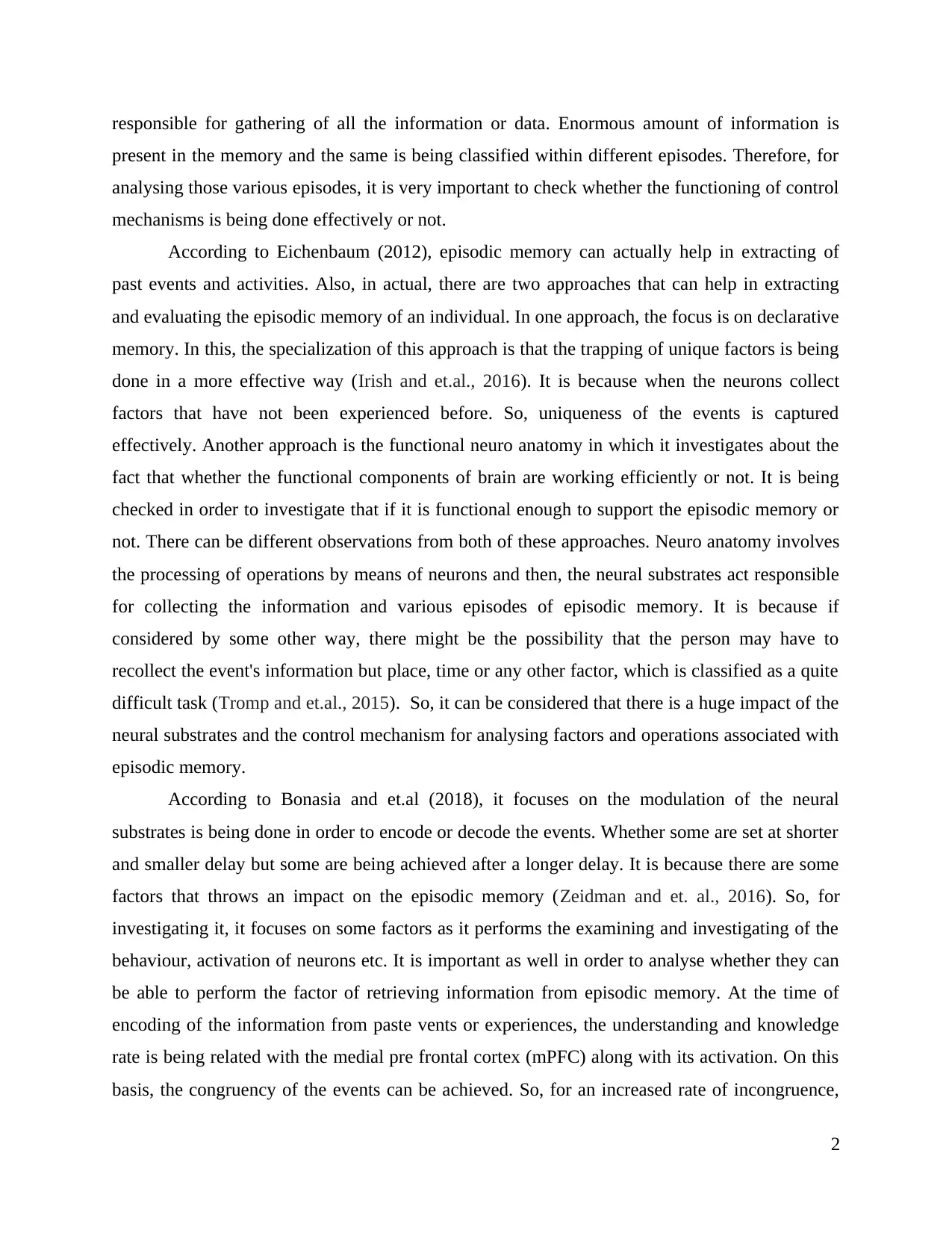
responsible for gathering of all the information or data. Enormous amount of information is
present in the memory and the same is being classified within different episodes. Therefore, for
analysing those various episodes, it is very important to check whether the functioning of control
mechanisms is being done effectively or not.
According to Eichenbaum (2012), episodic memory can actually help in extracting of
past events and activities. Also, in actual, there are two approaches that can help in extracting
and evaluating the episodic memory of an individual. In one approach, the focus is on declarative
memory. In this, the specialization of this approach is that the trapping of unique factors is being
done in a more effective way (Irish and et.al., 2016). It is because when the neurons collect
factors that have not been experienced before. So, uniqueness of the events is captured
effectively. Another approach is the functional neuro anatomy in which it investigates about the
fact that whether the functional components of brain are working efficiently or not. It is being
checked in order to investigate that if it is functional enough to support the episodic memory or
not. There can be different observations from both of these approaches. Neuro anatomy involves
the processing of operations by means of neurons and then, the neural substrates act responsible
for collecting the information and various episodes of episodic memory. It is because if
considered by some other way, there might be the possibility that the person may have to
recollect the event's information but place, time or any other factor, which is classified as a quite
difficult task (Tromp and et.al., 2015). So, it can be considered that there is a huge impact of the
neural substrates and the control mechanism for analysing factors and operations associated with
episodic memory.
According to Bonasia and et.al (2018), it focuses on the modulation of the neural
substrates is being done in order to encode or decode the events. Whether some are set at shorter
and smaller delay but some are being achieved after a longer delay. It is because there are some
factors that throws an impact on the episodic memory (Zeidman and et. al., 2016). So, for
investigating it, it focuses on some factors as it performs the examining and investigating of the
behaviour, activation of neurons etc. It is important as well in order to analyse whether they can
be able to perform the factor of retrieving information from episodic memory. At the time of
encoding of the information from paste vents or experiences, the understanding and knowledge
rate is being related with the medial pre frontal cortex (mPFC) along with its activation. On this
basis, the congruency of the events can be achieved. So, for an increased rate of incongruence,
2
present in the memory and the same is being classified within different episodes. Therefore, for
analysing those various episodes, it is very important to check whether the functioning of control
mechanisms is being done effectively or not.
According to Eichenbaum (2012), episodic memory can actually help in extracting of
past events and activities. Also, in actual, there are two approaches that can help in extracting
and evaluating the episodic memory of an individual. In one approach, the focus is on declarative
memory. In this, the specialization of this approach is that the trapping of unique factors is being
done in a more effective way (Irish and et.al., 2016). It is because when the neurons collect
factors that have not been experienced before. So, uniqueness of the events is captured
effectively. Another approach is the functional neuro anatomy in which it investigates about the
fact that whether the functional components of brain are working efficiently or not. It is being
checked in order to investigate that if it is functional enough to support the episodic memory or
not. There can be different observations from both of these approaches. Neuro anatomy involves
the processing of operations by means of neurons and then, the neural substrates act responsible
for collecting the information and various episodes of episodic memory. It is because if
considered by some other way, there might be the possibility that the person may have to
recollect the event's information but place, time or any other factor, which is classified as a quite
difficult task (Tromp and et.al., 2015). So, it can be considered that there is a huge impact of the
neural substrates and the control mechanism for analysing factors and operations associated with
episodic memory.
According to Bonasia and et.al (2018), it focuses on the modulation of the neural
substrates is being done in order to encode or decode the events. Whether some are set at shorter
and smaller delay but some are being achieved after a longer delay. It is because there are some
factors that throws an impact on the episodic memory (Zeidman and et. al., 2016). So, for
investigating it, it focuses on some factors as it performs the examining and investigating of the
behaviour, activation of neurons etc. It is important as well in order to analyse whether they can
be able to perform the factor of retrieving information from episodic memory. At the time of
encoding of the information from paste vents or experiences, the understanding and knowledge
rate is being related with the medial pre frontal cortex (mPFC) along with its activation. On this
basis, the congruency of the events can be achieved. So, for an increased rate of incongruence,
2
Secure Best Marks with AI Grader
Need help grading? Try our AI Grader for instant feedback on your assignments.
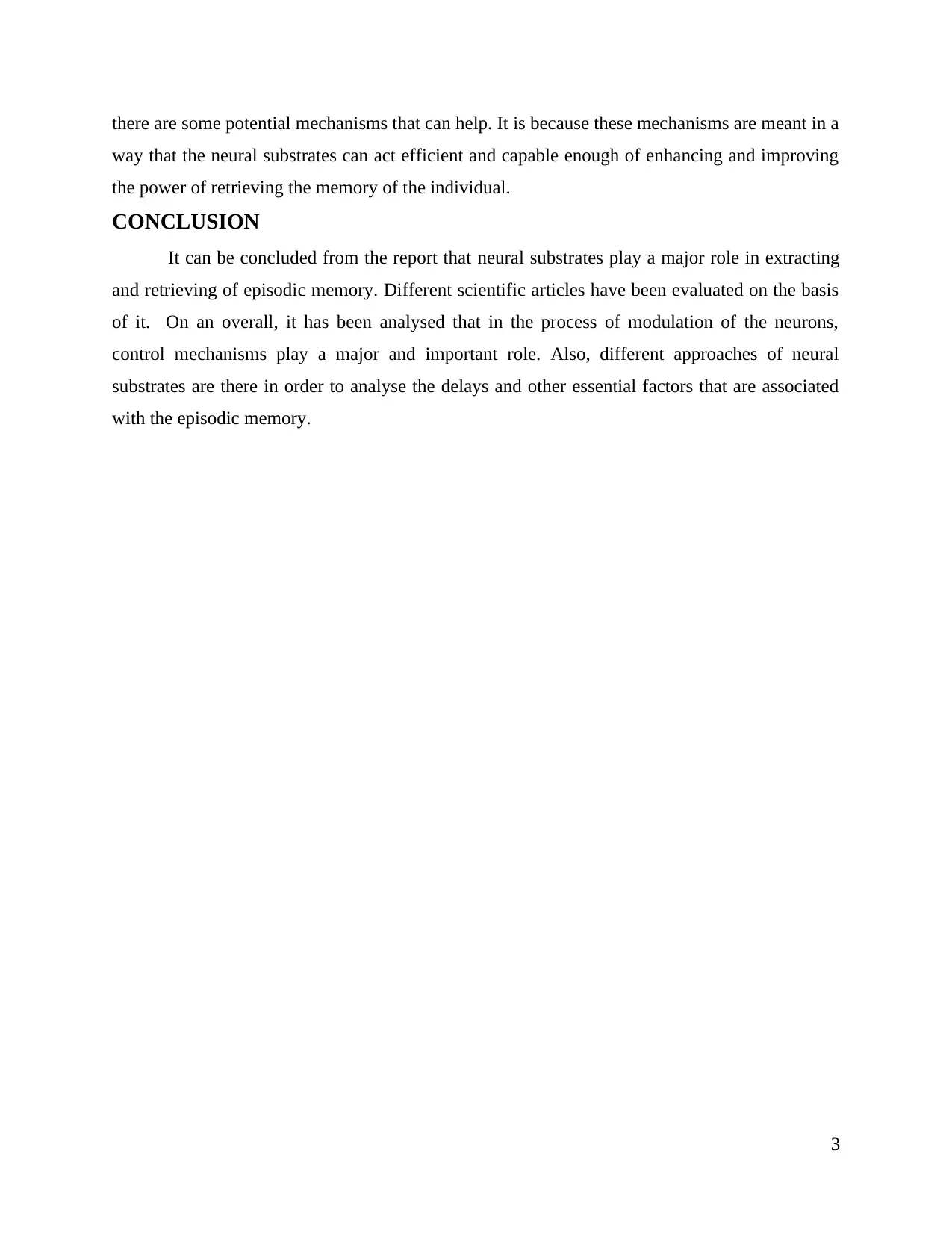
there are some potential mechanisms that can help. It is because these mechanisms are meant in a
way that the neural substrates can act efficient and capable enough of enhancing and improving
the power of retrieving the memory of the individual.
CONCLUSION
It can be concluded from the report that neural substrates play a major role in extracting
and retrieving of episodic memory. Different scientific articles have been evaluated on the basis
of it. On an overall, it has been analysed that in the process of modulation of the neurons,
control mechanisms play a major and important role. Also, different approaches of neural
substrates are there in order to analyse the delays and other essential factors that are associated
with the episodic memory.
3
way that the neural substrates can act efficient and capable enough of enhancing and improving
the power of retrieving the memory of the individual.
CONCLUSION
It can be concluded from the report that neural substrates play a major role in extracting
and retrieving of episodic memory. Different scientific articles have been evaluated on the basis
of it. On an overall, it has been analysed that in the process of modulation of the neurons,
control mechanisms play a major and important role. Also, different approaches of neural
substrates are there in order to analyse the delays and other essential factors that are associated
with the episodic memory.
3
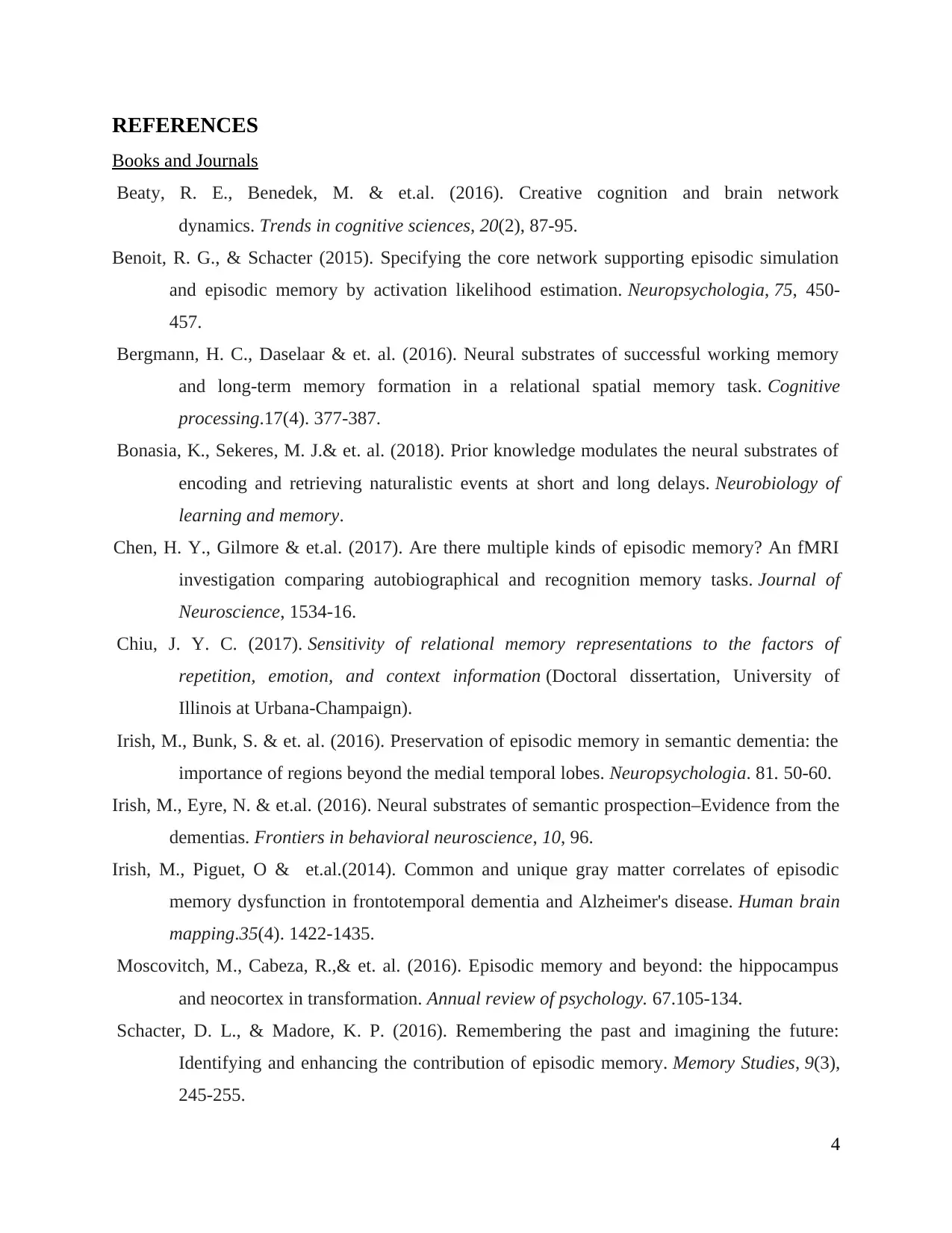
REFERENCES
Books and Journals
Beaty, R. E., Benedek, M. & et.al. (2016). Creative cognition and brain network
dynamics. Trends in cognitive sciences, 20(2), 87-95.
Benoit, R. G., & Schacter (2015). Specifying the core network supporting episodic simulation
and episodic memory by activation likelihood estimation. Neuropsychologia, 75, 450-
457.
Bergmann, H. C., Daselaar & et. al. (2016). Neural substrates of successful working memory
and long-term memory formation in a relational spatial memory task. Cognitive
processing.17(4). 377-387.
Bonasia, K., Sekeres, M. J.& et. al. (2018). Prior knowledge modulates the neural substrates of
encoding and retrieving naturalistic events at short and long delays. Neurobiology of
learning and memory.
Chen, H. Y., Gilmore & et.al. (2017). Are there multiple kinds of episodic memory? An fMRI
investigation comparing autobiographical and recognition memory tasks. Journal of
Neuroscience, 1534-16.
Chiu, J. Y. C. (2017). Sensitivity of relational memory representations to the factors of
repetition, emotion, and context information (Doctoral dissertation, University of
Illinois at Urbana-Champaign).
Irish, M., Bunk, S. & et. al. (2016). Preservation of episodic memory in semantic dementia: the
importance of regions beyond the medial temporal lobes. Neuropsychologia. 81. 50-60.
Irish, M., Eyre, N. & et.al. (2016). Neural substrates of semantic prospection–Evidence from the
dementias. Frontiers in behavioral neuroscience, 10, 96.
Irish, M., Piguet, O & et.al.(2014). Common and unique gray matter correlates of episodic
memory dysfunction in frontotemporal dementia and Alzheimer's disease. Human brain
mapping.35(4). 1422-1435.
Moscovitch, M., Cabeza, R.,& et. al. (2016). Episodic memory and beyond: the hippocampus
and neocortex in transformation. Annual review of psychology. 67.105-134.
Schacter, D. L., & Madore, K. P. (2016). Remembering the past and imagining the future:
Identifying and enhancing the contribution of episodic memory. Memory Studies, 9(3),
245-255.
4
Books and Journals
Beaty, R. E., Benedek, M. & et.al. (2016). Creative cognition and brain network
dynamics. Trends in cognitive sciences, 20(2), 87-95.
Benoit, R. G., & Schacter (2015). Specifying the core network supporting episodic simulation
and episodic memory by activation likelihood estimation. Neuropsychologia, 75, 450-
457.
Bergmann, H. C., Daselaar & et. al. (2016). Neural substrates of successful working memory
and long-term memory formation in a relational spatial memory task. Cognitive
processing.17(4). 377-387.
Bonasia, K., Sekeres, M. J.& et. al. (2018). Prior knowledge modulates the neural substrates of
encoding and retrieving naturalistic events at short and long delays. Neurobiology of
learning and memory.
Chen, H. Y., Gilmore & et.al. (2017). Are there multiple kinds of episodic memory? An fMRI
investigation comparing autobiographical and recognition memory tasks. Journal of
Neuroscience, 1534-16.
Chiu, J. Y. C. (2017). Sensitivity of relational memory representations to the factors of
repetition, emotion, and context information (Doctoral dissertation, University of
Illinois at Urbana-Champaign).
Irish, M., Bunk, S. & et. al. (2016). Preservation of episodic memory in semantic dementia: the
importance of regions beyond the medial temporal lobes. Neuropsychologia. 81. 50-60.
Irish, M., Eyre, N. & et.al. (2016). Neural substrates of semantic prospection–Evidence from the
dementias. Frontiers in behavioral neuroscience, 10, 96.
Irish, M., Piguet, O & et.al.(2014). Common and unique gray matter correlates of episodic
memory dysfunction in frontotemporal dementia and Alzheimer's disease. Human brain
mapping.35(4). 1422-1435.
Moscovitch, M., Cabeza, R.,& et. al. (2016). Episodic memory and beyond: the hippocampus
and neocortex in transformation. Annual review of psychology. 67.105-134.
Schacter, D. L., & Madore, K. P. (2016). Remembering the past and imagining the future:
Identifying and enhancing the contribution of episodic memory. Memory Studies, 9(3),
245-255.
4
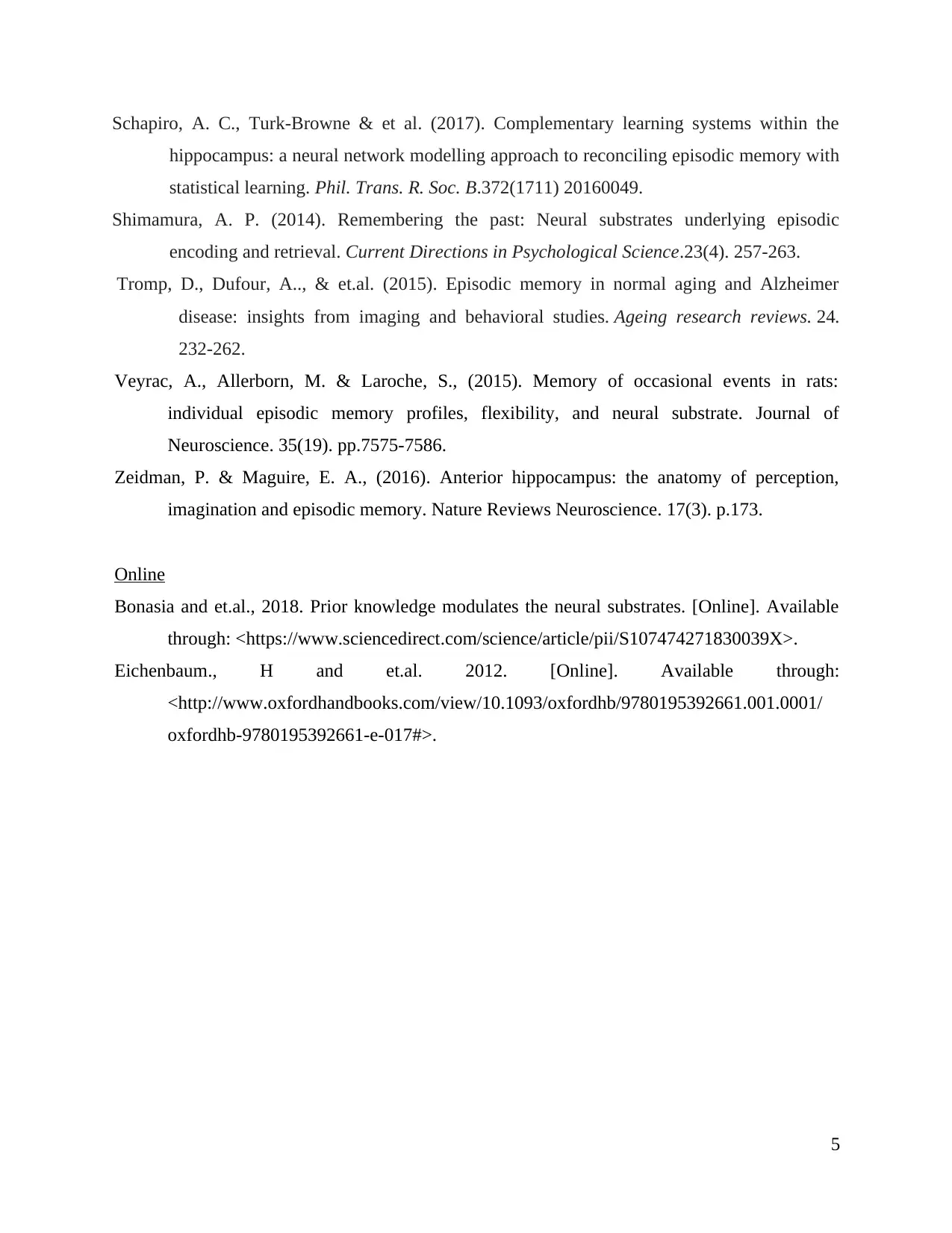
Schapiro, A. C., Turk-Browne & et al. (2017). Complementary learning systems within the
hippocampus: a neural network modelling approach to reconciling episodic memory with
statistical learning. Phil. Trans. R. Soc. B.372(1711) 20160049.
Shimamura, A. P. (2014). Remembering the past: Neural substrates underlying episodic
encoding and retrieval. Current Directions in Psychological Science.23(4). 257-263.
Tromp, D., Dufour, A.., & et.al. (2015). Episodic memory in normal aging and Alzheimer
disease: insights from imaging and behavioral studies. Ageing research reviews. 24.
232-262.
Veyrac, A., Allerborn, M. & Laroche, S., (2015). Memory of occasional events in rats:
individual episodic memory profiles, flexibility, and neural substrate. Journal of
Neuroscience. 35(19). pp.7575-7586.
Zeidman, P. & Maguire, E. A., (2016). Anterior hippocampus: the anatomy of perception,
imagination and episodic memory. Nature Reviews Neuroscience. 17(3). p.173.
Online
Bonasia and et.al., 2018. Prior knowledge modulates the neural substrates. [Online]. Available
through: <https://www.sciencedirect.com/science/article/pii/S107474271830039X>.
Eichenbaum., H and et.al. 2012. [Online]. Available through:
<http://www.oxfordhandbooks.com/view/10.1093/oxfordhb/9780195392661.001.0001/
oxfordhb-9780195392661-e-017#>.
5
hippocampus: a neural network modelling approach to reconciling episodic memory with
statistical learning. Phil. Trans. R. Soc. B.372(1711) 20160049.
Shimamura, A. P. (2014). Remembering the past: Neural substrates underlying episodic
encoding and retrieval. Current Directions in Psychological Science.23(4). 257-263.
Tromp, D., Dufour, A.., & et.al. (2015). Episodic memory in normal aging and Alzheimer
disease: insights from imaging and behavioral studies. Ageing research reviews. 24.
232-262.
Veyrac, A., Allerborn, M. & Laroche, S., (2015). Memory of occasional events in rats:
individual episodic memory profiles, flexibility, and neural substrate. Journal of
Neuroscience. 35(19). pp.7575-7586.
Zeidman, P. & Maguire, E. A., (2016). Anterior hippocampus: the anatomy of perception,
imagination and episodic memory. Nature Reviews Neuroscience. 17(3). p.173.
Online
Bonasia and et.al., 2018. Prior knowledge modulates the neural substrates. [Online]. Available
through: <https://www.sciencedirect.com/science/article/pii/S107474271830039X>.
Eichenbaum., H and et.al. 2012. [Online]. Available through:
<http://www.oxfordhandbooks.com/view/10.1093/oxfordhb/9780195392661.001.0001/
oxfordhb-9780195392661-e-017#>.
5
1 out of 7
Your All-in-One AI-Powered Toolkit for Academic Success.
+13062052269
info@desklib.com
Available 24*7 on WhatsApp / Email
![[object Object]](/_next/static/media/star-bottom.7253800d.svg)
Unlock your academic potential
© 2024 | Zucol Services PVT LTD | All rights reserved.


